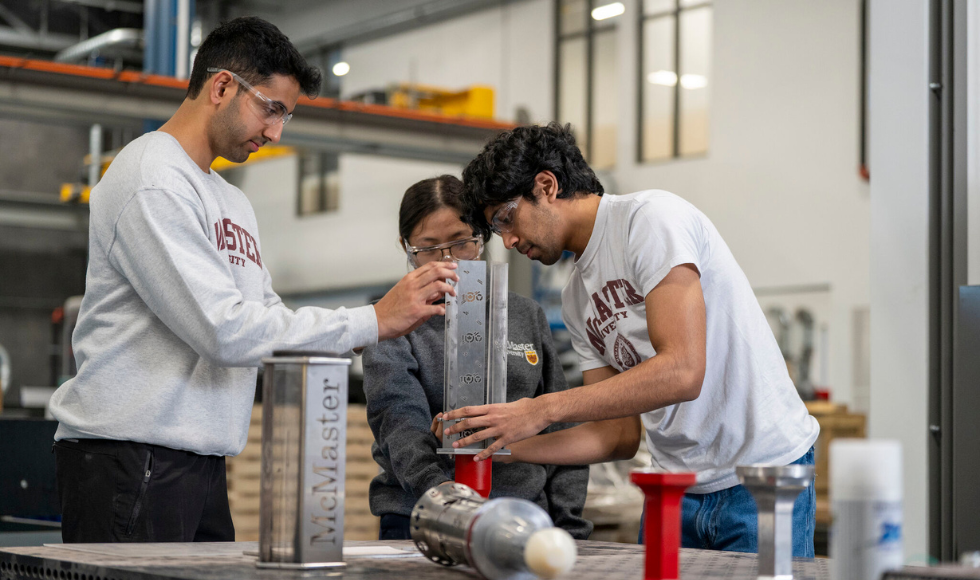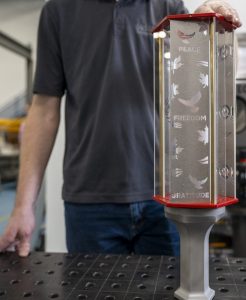Passing the torch: Engineering students’ design part of global D-Day 80th anniversary events

Students Kyle De Souza, Gregory Desouza and Vanessa Ho will take the global stage with veterans at commemorative ceremonies in Ottawa and Normandy this June, carrying a torch they designed for the milestone event.
The D-Day landings along the shores of Normandy, France, changed the course of the Second World War. Now, three McMaster Engineering students have are helping to commemorate this pivotal moment in history.
The students will be participating in commemorative ceremonies in Ottawa and Normandy with veterans and dignitaries for the 80th anniversary of D-Day this June, carrying a torch they designed for the milestone event.
The design process also inspired a spin-off project and gave the students involved a new-found appreciation for active remembrance.
Kyle De Souza, Gregory Desouza and Vanessa Ho were tasked with reimagining the Canadian Remembrance Torch (CRT) for their final-year capstone project.
A McMaster student group previously designed a version for the 75th anniversary of the Dutch Liberation.
A lighter, brighter and more fuel-efficient torch was the result of students’ ingenuity and the equipment and expertise available to them at the McMaster Manufacturing Research Institute (MMRI).
Engineering with impact
Machining, 3D modelling, CAD, waterjet cutting and heat transfer calculations all factored in to the torch design, as did practical considerations brought forth by client Karen Hunter, founder and executive director of the CRT.
 “We needed to consider torch etiquette in our technical decisions,” says De Souza. “It must be easy to light on the go, not create any mess from the fuel source, maintain a steady flame for the duration of a ceremony and be light enough to hold with one hand out in front of you.”
“We needed to consider torch etiquette in our technical decisions,” says De Souza. “It must be easy to light on the go, not create any mess from the fuel source, maintain a steady flame for the duration of a ceremony and be light enough to hold with one hand out in front of you.”
Drawing inspiration from the vortex flame of a tiki torch, the students achieved a rising fire effect with the use of steel panels with cutouts surrounded by glass, allowing ample air flow.
The fuel source, odourless paraffin oil, has a longer burn time than the previous torch iteration, which used a candle.
Each panel features doves, maple leaves and the rolling waves of Normandy Beach ith the CRT charity logo and a McMaster Engineering fireball.
“We wanted to ensure that the Torch not only functioned optimally for its commemorative purpose but that it’s aesthetically pleasing,” says Ho. “Building a sense of connection with the people who see it is important.”
Promoting active remembrance
Through the CRT, Hunter is focused on remembrance focused on pride and today’s world.
“Peace and freedom can be taken for granted when it’s all you’ve ever known,” she says.
The charity’s goal is to promote contemporary remembrance year-round that is about the present, as well as the past, “focused on pride and celebration rather than sadness.”
Involving young people in her charity’s mission is a priority for Hunter, who says torchbearers will be responsible for carrying on the legacy of remembrance. It’s a legacy that the McMaster students have come to better understand through their capstone experience.
“There used to be one day a year reserved to commemorate our veterans’ sacrifices. Now, working on this project, I’m thinking about remembrance almost every day,” says Ho.
Motivated by Hunter’s passion and working for eight months on the meticulous design project brought the students closer to its purpose.
“We come from immigrant families and are learning about those who paved the way for us to be here and live in this country,” says De Souza. “Representing their legacy in any way we can is important. I’m particularly excited to see veterans’ reaction to the Torch.”
The Light of Liberation spin-off
The CRT created another opportunity for the students’ design to shine: U.K.-based organization, the Commonwealth War Graves Commission (CWGC), requested the creation of 14 torches to use in their ceremonies up to and including the Normandy anniversary.
Drawing from the students’ design, the torches were manufactured by staff at MMRI, including the students’ mentors — program manager Kevin Lytwyn, facilities manager Brady Semple, and MMRI director and professor Stephen Veldhuis.
“The McMaster Manufacturing Research Institute’s cutting-edge technology and expertise of our multi-disciplinary team was a fitting environment for creating the additional torches,” says Veldhuis.
“We’re tremendously proud of our students involved in the torches’ design and the MMRI team who manufactured them, and to see part of McMaster represented overseas at ceremonies of commemoration.”
The torches arrived overseas in May, ahead of multiple ceremonies leading up to June 6.
“McMaster has delivered something of real purpose and gravitas that will honour our veterans and excite the next generation,” said Peter Francis, chief of staff of the Commission.
“McMaster responded to our request with dedication, ingenuity, and enthusiasm and have created 14 stunning torches – one for each of the combatant nations involved in Normandy – that will play a hugely important practical and symbolic role in the commemorations.
The journey begins
De Souza represented the student group in Ottawa for acknowledgement in Parliament by MP Marie-France Lalonde, Parliamentary Secretary to the Minister of National Defence, the lighting of the Torch on Parliament Hill from the Centennial Flame and a procession to the War Memorial.
He’s also participating in the Canadian Tulip Festival’s Opening Ceremony, honouring the 100th anniversary of the Royal Canadian Air Force.
All three students will travel to Normandy in early June to serve as torchbearers for various events with national and international attention, including a ceremony on Juno Beach with the prime minister and other world leaders.
“We hope when people see the torches they feel inspired,” says Greg Desouza. “Their flames shine a light on the past and on the way forward. We’re proud to be a part of these events.”

